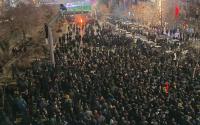16 February 2007Jennifer Steinhauer
Frustrated by the inability of Democrats in Congress to pass a resolution opposing President Bush’s policies in Iraq, state legislators across the country, led by Democrats and under pressure from liberal advocacy groups, are pushing forward with their own resolutions.
Resolutions have passed in chambers of three legislatures, in California, Iowa and Vermont. The Maryland General Assembly sent a letter to its Congressional delegation, signed by a majority of the State Senate and close to a majority of the House, urging opposition to the increase in troops in Iraq.
Letters or resolutions are being drafted in at least 19 other states. The goal is to embarrass Congress into passing its own resolution and to provide cover for Democrats and Republicans looking for concrete evidence back home that anti-Iraq resolutions enjoy popular support.
“The end of this war has to start sometime and somewhere,” the president of the Iowa Senate, John P. Kibbie, a Democrat, said Thursday. “And stopping the expansion of these troops needs to happen now.”
The activity was spurred in a conference call last month that included state legislators; Senator Edward M. Kennedy, Democrat of Massachusetts; and advocacy groups like the Progressive States Network and MoveOn.org.
Mr. Kennedy said pressure by the states would push Washington to oppose the Iraq plans of the Bush administration. “Your voices, your calls, your e-mails and your resolutions have an impact on the debate,” Mr. Kennedy said.
Many Republicans in state legislatures have remained silent on the resolutions, seeing no advantage in signing or voting for them. Others have called the actions essentially votes of no confidence in the troops on the ground.
“These resolutions are a colossal waste of time,” said Kris Kobach, chairman of the Republican Party in Kansas, where a resolution was killed in committee. “Legislatures are spending valuable and limited time acting in an area where they have no authority. If all we are doing is sending messages, we should be concerned about the fact that soldiers are being told that their states are not behind them. I think that is particularly troubling.”
Many resolutions use language from the Progressive States Network that apes language in a proposed resolution in Congress that says President Bush should obtain explicit Congressional approval before adding troops in Iraq.
Other resolutions go further, calling for a deadline for departure, immediate troop withdrawal or stopping the financing of the war. The votes have largely fallen along party lines — Democrats for and Republicans against — although there have been exceptions. In North Dakota, a Democrat and a Republican are sponsoring a resolution urging Congress and Mr. Bush to “disengage American combat forces in Iraq.”
In a vote on Thursday in the Iowa Senate, Republicans insisted on a voice vote rather than a roll call on a resolution to condemn the increase in troops. The measure, which passed, is headed to the House, where its fate is uncertain.
The resolutions, much like the ones that Congress is considering, are nonbinding and have little effect beyond politics. But the states’ debates function as an echo chamber for the debate over withdrawing troops from Iraq and help demonstrate growing concerns on the war.
“These resolutions have generated an incredible amount of local media,” said Joel Barkin, executive director of the Progressive States Network, a liberal group that works to influence bills. “So they raise awareness that this is a local issue. But it is aimed at pressuring the Congress.”
In California, Democrats and Republicans in the State Senate spoke passionately about a resolution that passed on Tuesday.
“As a people, we are getting fed up and want to express it and not be haunted by the effects of silence,” said State Senator Carole Migden, Democrat of San Francisco, who sponsored the resolution. “We are trying to capture the mood of the people and offer some guidance as to how the largest state in the union is disposed in the matter.”
State Senator Dennis Hollingsworth, Republican of Temecula, an opponent of the measure, said: “This resolution talks about not only opposing the troop increase but cutting off their funding. It lays bare the Democrats’ true intentions. So they can stop the platitudes about supporting the troops but not supporting the mission. They want us to lose this war.”
In states where Republicans control the legislatures, passage of such antiwar resolutions seems unlikely. Kansas lawmakers held a perfunctory hearing, only to have the committee chairman, Senator Pete Brungardt, Republican of Salina, say he would not schedule a vote.
“A number of people felt that was a rather public vote without an upside,” Mr. Brungardt said. “There is not really a winning answer for them.”
http://www.nytimes.com/2007/02/16/us/16pressure.html?_r=2&oref=slogin&oref=slogin






